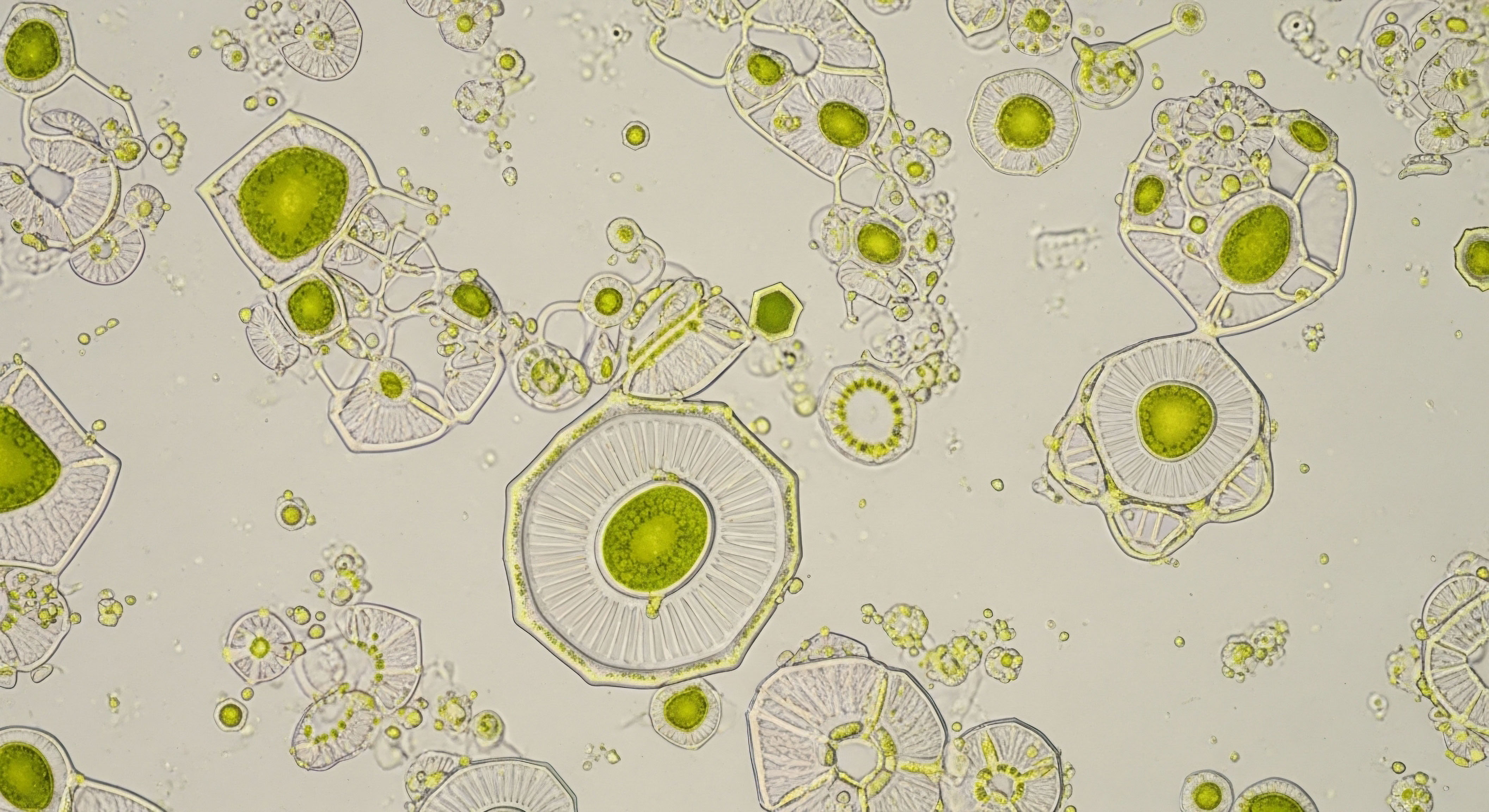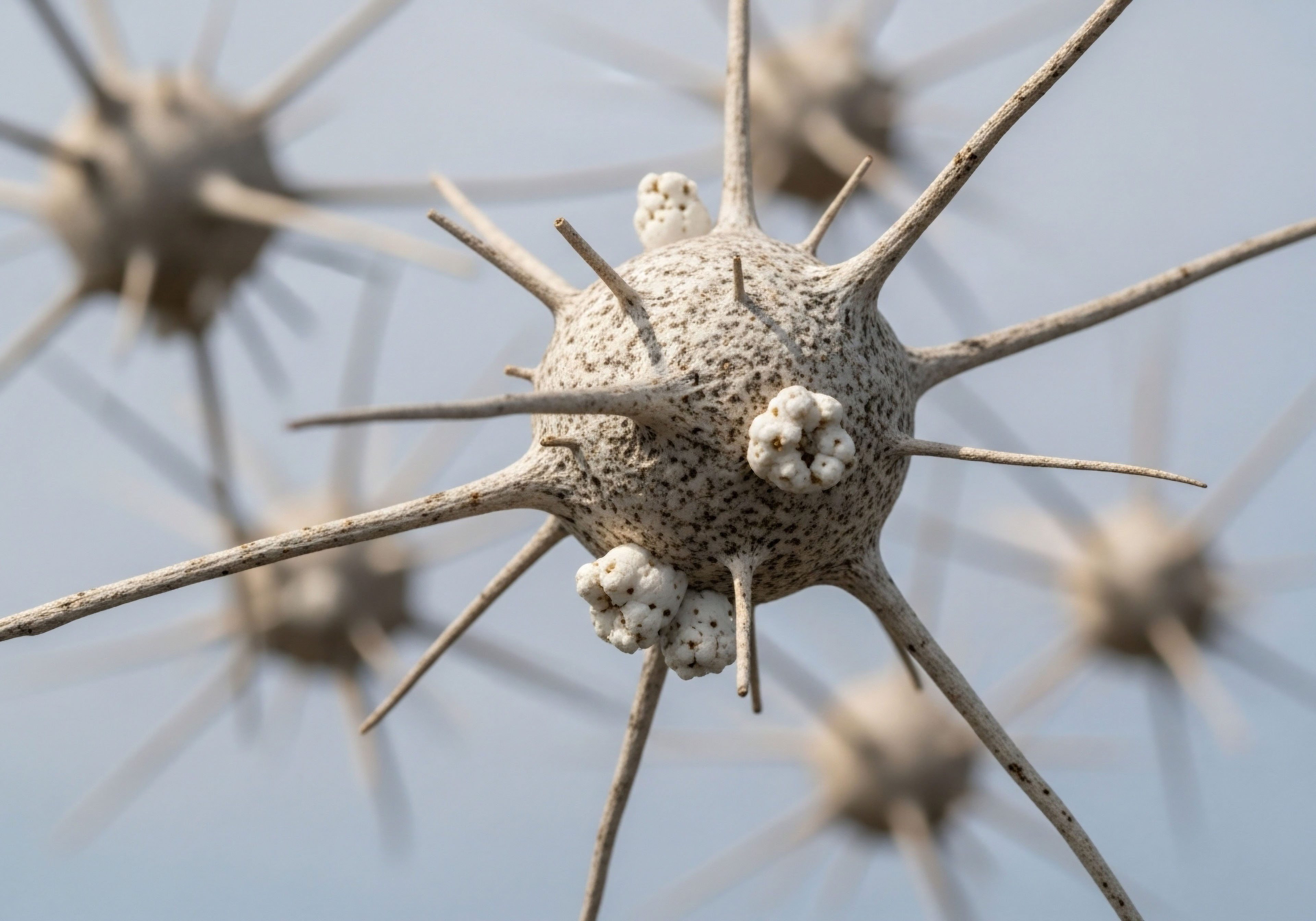

Fundamentals
Many individuals experience a subtle yet persistent shift in their mental landscape, a sense of diminished clarity or a struggle with focus that seems to defy simple explanation. Perhaps you find yourself searching for words that once came easily, or notice a general blunting of your mental edge.
This experience, often dismissed as a normal part of aging or daily stress, frequently signals a deeper conversation occurring within your body’s intricate internal communication network. Your physical and mental vitality are not separate entities; they are deeply intertwined, orchestrated by a symphony of biochemical messengers.
Understanding your own biological systems represents a profound step toward reclaiming vitality and function without compromise. The endocrine system, a complex network of glands and hormones, serves as the body’s primary messaging service, directing virtually every physiological process. Hormones, these powerful chemical signals, travel through the bloodstream, delivering instructions to cells and tissues throughout the body. Among these vital messengers, testosterone holds a significant, often underestimated, position, extending its influence far beyond its commonly recognized roles in physical attributes.
Testosterone, present in both men and women, plays a fundamental role in maintaining overall physiological balance. Its impact extends to muscle mass, bone density, mood regulation, and even cardiovascular health. What many do not fully appreciate is its direct and substantial contribution to cognitive function.
This hormone interacts with specific receptors in various brain regions, influencing processes related to memory, attention, and spatial reasoning. When its levels deviate from optimal ranges, the subtle yet noticeable cognitive shifts you experience can often be traced back to this hormonal recalibration.
The body’s hormonal systems operate through sophisticated feedback loops, akin to a finely tuned thermostat. The Hypothalamic-Pituitary-Gonadal (HPG) axis serves as a central command center for testosterone production. The hypothalamus releases gonadotropin-releasing hormone (GnRH), which signals the pituitary gland to release luteinizing hormone (LH) and follicle-stimulating hormone (FSH).
These pituitary hormones then stimulate the gonads (testes in men, ovaries in women) to produce testosterone. This intricate dance ensures that hormone levels remain within a healthy range, responding to the body’s needs.
Your cognitive sharpness and overall mental well-being are profoundly influenced by the delicate balance of your internal hormonal messengers, particularly testosterone.
External influences, often referred to as lifestyle factors, exert a powerful regulatory effect on this internal communication system. Your daily habits, choices, and environmental exposures do not merely affect your superficial well-being; they directly modulate the production, utilization, and efficacy of your hormones.
Sleep patterns, nutritional intake, stress management, and physical activity are not isolated elements of health; they are direct inputs into your endocrine orchestra, shaping its performance and, consequently, your cognitive output. Recognizing this interconnectedness is the initial step toward understanding how to support your body’s innate intelligence.


Intermediate
The subtle decline in mental acuity, often characterized by difficulty concentrating or a general feeling of mental sluggishness, frequently prompts individuals to seek explanations. While many factors contribute to cognitive vitality, the influence of lifestyle on testosterone’s impact on brain function is a subject deserving of precise consideration. Your daily routines and environmental interactions directly shape your hormonal landscape, which in turn dictates the clarity and efficiency of your thought processes.

How Daily Habits Shape Hormonal Balance
The intricate interplay between lifestyle factors and testosterone levels is a dynamic one. Consider the foundational role of sleep quality. Insufficient or fragmented sleep disrupts the natural circadian rhythm of hormone release, including testosterone. Studies indicate that chronic sleep deprivation can significantly reduce circulating testosterone, as the majority of its daily production occurs during deep sleep cycles. This reduction directly impacts brain regions reliant on testosterone for optimal function, leading to impaired memory consolidation and reduced executive function.
Nutritional choices represent another powerful modulator of endocrine health. A diet rich in processed foods, refined sugars, and unhealthy fats can promote systemic inflammation and insulin resistance, both of which are detrimental to testosterone synthesis and receptor sensitivity. Conversely, a balanced intake of healthy fats, lean proteins, and micronutrient-dense vegetables provides the necessary building blocks and cofactors for hormone production. Specific nutrients, such as zinc, vitamin D, and magnesium, are indispensable for the enzymatic pathways involved in testosterone biosynthesis.
Optimizing sleep, nutrition, and stress management provides a foundational strategy for supporting healthy testosterone levels and enhancing cognitive performance.
Chronic psychological or physiological stress activates the hypothalamic-pituitary-adrenal (HPA) axis, leading to sustained elevation of cortisol. Cortisol, often termed the “stress hormone,” can directly suppress testosterone production through various mechanisms, including inhibiting GnRH release from the hypothalamus. This hormonal antagonism creates a challenging environment for cognitive processes, as elevated cortisol is independently associated with impaired memory and attention. Managing stress through mindfulness, relaxation techniques, or structured breaks becomes a direct intervention for hormonal and cognitive well-being.
Regular physical activity, particularly resistance training and high-intensity interval training (HIIT), is a well-established stimulus for testosterone production. Exercise enhances insulin sensitivity, reduces adiposity (which can convert testosterone to estrogen), and improves overall metabolic health, all contributing to a more favorable hormonal milieu. The type, intensity, and consistency of physical activity collectively influence its impact on endocrine function and, consequently, cognitive vitality.

Clinical Protocols for Hormonal Recalibration
When lifestyle adjustments alone prove insufficient to restore optimal testosterone levels and alleviate cognitive concerns, targeted clinical protocols can provide precise biochemical recalibration. These interventions aim to restore hormonal balance, thereby supporting improved cognitive function and overall well-being.

Testosterone Replacement Therapy for Men
For middle-aged to older men experiencing symptoms of low testosterone, Testosterone Replacement Therapy (TRT) offers a structured approach to restoring physiological levels. A standard protocol often involves weekly intramuscular injections of Testosterone Cypionate (200mg/ml). This exogenous testosterone helps to alleviate symptoms such as fatigue, reduced libido, and the cognitive dullness often associated with hypogonadism.
To maintain natural testosterone production and preserve fertility, particularly in younger men or those desiring future procreation, Gonadorelin is frequently included. This peptide is administered via subcutaneous injections, typically twice weekly, to stimulate the pituitary gland’s release of LH and FSH.
Managing potential side effects, such as the conversion of testosterone to estrogen, is addressed with agents like Anastrozole, an aromatase inhibitor taken orally twice weekly. This helps to prevent estrogen dominance, which can lead to undesirable effects like gynecomastia or mood fluctuations. In some cases, Enclomiphene may be incorporated to specifically support LH and FSH levels, further promoting endogenous testosterone synthesis.
| Component | Primary Purpose | Administration |
|---|---|---|
| Testosterone Cypionate | Restore testosterone levels | Weekly intramuscular injection |
| Gonadorelin | Maintain natural production, fertility | 2x/week subcutaneous injection |
| Anastrozole | Block estrogen conversion | 2x/week oral tablet |
| Enclomiphene | Support LH and FSH levels | Oral (as prescribed) |

Testosterone Optimization for Women
Women, particularly those in pre-menopausal, peri-menopausal, or post-menopausal stages, can also experience symptoms related to suboptimal testosterone levels, including irregular cycles, mood changes, hot flashes, and diminished libido. Cognitive complaints are also common in this context.
Protocols for women typically involve lower doses of Testosterone Cypionate, often 10 ∞ 20 units (0.1 ∞ 0.2ml) weekly via subcutaneous injection. This precise dosing aims to restore physiological balance without inducing masculinizing side effects. Progesterone is prescribed based on menopausal status, playing a vital role in uterine health and hormonal equilibrium.
For long-acting delivery, pellet therapy, involving subcutaneous insertion of testosterone pellets, offers sustained release. Anastrozole may be used when appropriate to manage estrogen levels, particularly in post-menopausal women or those with specific hormonal profiles.

Post-TRT or Fertility-Stimulating Protocols for Men
For men who have discontinued TRT or are actively trying to conceive, specific protocols are implemented to restore natural testicular function and sperm production. This typically involves a combination of agents designed to stimulate the HPG axis. Gonadorelin continues to play a role in this context, alongside selective estrogen receptor modulators (SERMs) like Tamoxifen and Clomid.
These medications work by blocking estrogen’s negative feedback on the pituitary, thereby increasing LH and FSH release, which in turn stimulates endogenous testosterone and spermatogenesis. Anastrozole may be an optional addition to manage estrogen levels during this recalibration phase.

Targeted Peptide Therapies
Beyond traditional hormonal optimization, specific peptide therapies offer additional avenues for supporting overall physiological function, including aspects relevant to cognitive vitality. These agents interact with specific receptors to modulate various biological processes.
- Sermorelin ∞ This growth hormone-releasing hormone (GHRH) analog stimulates the pituitary to produce and release growth hormone. It is often used by active adults and athletes seeking anti-aging benefits, muscle gain, fat loss, and improved sleep quality, all of which indirectly support cognitive function by enhancing systemic health.
- Ipamorelin / CJC-1295 ∞ These peptides also act as growth hormone secretagogues, promoting a more sustained and physiological release of growth hormone. Their benefits align with those of Sermorelin, contributing to cellular repair and metabolic efficiency.
- Tesamorelin ∞ A GHRH analog specifically approved for reducing visceral fat, Tesamorelin’s systemic benefits can also contribute to improved metabolic health, which has downstream effects on brain function.
- Hexarelin ∞ Another growth hormone-releasing peptide, Hexarelin offers similar benefits to Ipamorelin and CJC-1295, supporting tissue repair and recovery.
- MK-677 ∞ An oral growth hormone secretagogue, MK-677 provides a non-injectable option for stimulating growth hormone release, with similar systemic benefits.
Other targeted peptides address specific aspects of well-being. PT-141, for instance, is a melanocortin receptor agonist used for sexual health, addressing aspects of libido that can be intertwined with overall hormonal balance and mental state. Pentadeca Arginate (PDA) is recognized for its roles in tissue repair, accelerating healing processes, and modulating inflammation.
Reducing systemic inflammation can have direct positive implications for brain health and cognitive clarity. These peptide protocols represent a sophisticated approach to supporting the body’s innate healing and regulatory mechanisms, contributing to a comprehensive strategy for well-being.


Academic
The connection between lifestyle factors, testosterone, and cognitive function extends into the complex neuroendocrine architecture of the human brain. To truly comprehend how daily choices influence mental sharpness, one must examine the molecular and cellular mechanisms at play within the central nervous system. Testosterone, far from being solely a reproductive hormone, acts as a potent neurosteroid, exerting direct and indirect effects on neuronal health, neurotransmission, and brain plasticity.

Neuroendocrine Mechanisms of Testosterone’s Cognitive Impact
Testosterone influences cognitive function through multiple pathways. Within the brain, neurons express receptors for both androgens (like testosterone and dihydrotestosterone, DHT) and estrogens. Testosterone can directly bind to androgen receptors (ARs) located in various brain regions, including the hippocampus, prefrontal cortex, and amygdala. These regions are critical for memory formation, executive function, and emotional regulation, respectively. Activation of ARs can modulate gene expression, influencing neuronal growth, survival, and synaptic connectivity.
A significant portion of testosterone’s neurocognitive effects are mediated after its conversion to estrogen by the enzyme aromatase, which is abundant in the brain. Estrogen receptors (ERα and ERβ) are also widely distributed throughout the brain, particularly in areas associated with cognition.
This local aromatization means that testosterone’s impact on memory and mood is often a dual action, involving both its direct androgenic effects and its indirect estrogenic effects. For instance, estrogen derived from testosterone can promote hippocampal neurogenesis and synaptic plasticity, processes fundamental to learning and memory.
Testosterone’s influence on cognitive function is a sophisticated interplay of direct androgen receptor activation and its conversion to estrogen within the brain, affecting neuronal health and neurotransmission.
The influence of testosterone extends to neurotransmitter systems, which are the brain’s chemical communication pathways. Testosterone and its metabolites can modulate the synthesis, release, and reuptake of key neurotransmitters such as dopamine, serotonin, and acetylcholine. Dopamine pathways, crucial for motivation, reward, and attention, are particularly sensitive to androgen levels.
Optimal testosterone levels support dopaminergic tone, contributing to improved focus and drive. Serotonin, involved in mood regulation and anxiety, and acetylcholine, vital for memory and learning, also exhibit sensitivity to hormonal fluctuations. Disruptions in these neurotransmitter systems, often exacerbated by suboptimal testosterone, can manifest as cognitive deficits and mood disturbances.

Interplay with Metabolic Health and Inflammation
The brain’s health is inextricably linked to systemic metabolic function and inflammatory status. Lifestyle factors that negatively impact testosterone often simultaneously contribute to metabolic dysregulation and chronic low-grade inflammation, creating a synergistic detrimental effect on cognitive performance.
Insulin resistance, often driven by poor dietary habits and sedentary living, is a state where cells become less responsive to insulin, leading to elevated blood glucose. This condition is strongly associated with reduced testosterone levels and impaired cognitive function, particularly in areas of memory and executive processing.
Insulin resistance can directly affect brain energy metabolism, leading to neuronal dysfunction and increased oxidative stress. Testosterone, conversely, plays a role in maintaining insulin sensitivity, creating a feedback loop where optimal levels support metabolic health, which in turn supports brain function.
Chronic systemic inflammation, fueled by factors like poor nutrition, inadequate sleep, and unmanaged stress, can cross the blood-brain barrier and induce neuroinflammation. Inflammatory cytokines can directly impair synaptic plasticity, disrupt neurotransmitter balance, and contribute to neuronal damage. Low testosterone levels are often correlated with higher inflammatory markers, suggesting a reciprocal relationship. By supporting healthy testosterone levels through lifestyle interventions or clinical protocols, one can indirectly mitigate systemic and neuroinflammation, thereby protecting cognitive integrity.

Growth Hormone Peptides and Neuroprotection
The role of growth hormone (GH) and its stimulating peptides extends beyond muscle and fat metabolism, offering significant neuroprotective and cognitive benefits. Peptides like Sermorelin, Ipamorelin/CJC-1299, and MK-677 stimulate the endogenous release of GH, which then promotes the production of Insulin-like Growth Factor 1 (IGF-1). Both GH and IGF-1 are critical for brain health.
IGF-1 receptors are widely distributed in the brain, particularly in the hippocampus and cerebral cortex. IGF-1 supports neuronal survival, promotes neurogenesis (the birth of new neurons), enhances synaptic plasticity, and improves cerebral blood flow. These actions are fundamental for learning, memory, and overall cognitive resilience. By optimizing GH/IGF-1 axis function, these peptides indirectly support the brain’s ability to adapt and maintain function in the face of various stressors.
| Peptide Category | Mechanism of Action | Cognitive Relevance |
|---|---|---|
| Growth Hormone Secretagogues (e.g. Sermorelin, Ipamorelin) | Stimulate endogenous GH release, increasing IGF-1 | Neurogenesis, synaptic plasticity, improved cerebral blood flow, neuronal survival |
| PT-141 (Bremelanotide) | Melanocortin receptor agonist | Modulates sexual desire; indirectly impacts mood and focus via hormonal satisfaction |
| Pentadeca Arginate (PDA) | Tissue repair, anti-inflammatory properties | Reduces neuroinflammation, supports cellular integrity, enhances recovery from neuronal stress |
The interconnectedness of the endocrine system, metabolic pathways, and inflammatory responses paints a comprehensive picture of cognitive health. Lifestyle factors serve as the primary regulators of this complex system, while targeted clinical protocols offer precise tools for recalibration when needed. Understanding these deep biological mechanisms empowers individuals to make informed choices that support not only their hormonal balance but also their sustained cognitive vitality.

Does Testosterone Therapy Improve Memory Function?
The question of whether testosterone therapy directly improves memory function is a subject of ongoing clinical investigation. Research indicates that testosterone plays a role in various aspects of cognition, including spatial memory, verbal memory, and executive function. In individuals with clinically low testosterone levels, restoring these levels through therapy often correlates with improvements in specific cognitive domains.
The mechanisms involve direct action on androgen receptors in memory-related brain regions and indirect effects through its conversion to estrogen, which also supports neuronal health.

What Is the Relationship between Testosterone and Neurotransmitter Balance?
Testosterone exerts a significant influence on the balance of key neurotransmitters within the brain. It can modulate the synthesis and activity of dopamine, a neurotransmitter essential for motivation, reward, and attention. Suboptimal testosterone levels can lead to reduced dopaminergic tone, contributing to feelings of apathy or difficulty concentrating.
Similarly, testosterone can influence serotonin pathways, which are critical for mood regulation and anxiety levels. A balanced hormonal environment, supported by healthy testosterone levels, contributes to optimal neurotransmitter function, thereby supporting overall cognitive and emotional well-being.

Can Lifestyle Interventions Reverse Cognitive Decline Related to Hormonal Imbalance?
Lifestyle interventions hold substantial potential for mitigating and even reversing cognitive decline associated with hormonal imbalances. By optimizing sleep, adopting a nutrient-dense diet, implementing effective stress management techniques, and engaging in regular, appropriate physical activity, individuals can significantly influence their endogenous hormone production and sensitivity.
These interventions address the root causes of hormonal dysregulation, creating a more favorable internal environment for testosterone synthesis and action. While severe deficiencies may require clinical intervention, lifestyle modifications serve as a powerful foundational strategy for supporting cognitive vitality and overall endocrine health.

References
- Mooradian, Arshag D. et al. “Biological actions of androgens.” Endocrine Reviews, vol. 8, no. 1, 1987, pp. 1-28.
- Davis, Susan R. et al. “Testosterone in women ∞ the clinical significance.” The Lancet Diabetes & Endocrinology, vol. 2, no. 12, 2014, pp. 980-992.
- Veldhuis, Johannes D. et al. “Diversity in the mechanisms of growth hormone (GH) secretion and action ∞ an overview.” Journal of Clinical Endocrinology & Metabolism, vol. 86, no. 10, 2001, pp. 4684-4693.
- Rosario, Paula W. et al. “Testosterone and cognition ∞ a systematic review.” Arquivos Brasileiros de Endocrinologia & Metabologia, vol. 56, no. 5, 2012, pp. 307-314.
- Zarrouf, Fadi A. et al. “Testosterone and depression ∞ systematic review and meta-analysis.” Journal of Clinical Psychiatry, vol. 71, no. 12, 2010, pp. 1601-1606.
- Kalinchenko, Sergey Y. et al. “Effects of testosterone administration on body composition, metabolic parameters and sexual function in men with metabolic syndrome.” Aging Male, vol. 14, no. 1, 2011, pp. 57-62.
- Boron, Walter F. and Emile L. Boulpaep. Medical Physiology. 3rd ed. Elsevier, 2017.
- Guyton, Arthur C. and John E. Hall. Textbook of Medical Physiology. 13th ed. Elsevier, 2016.
- Snyder, Peter J. et al. “Effects of testosterone treatment in older men.” New England Journal of Medicine, vol. 371, no. 11, 2014, pp. 1014-1023.
- Katznelson, L. et al. “Growth hormone deficiency in adults ∞ an Endocrine Society Clinical Practice Guideline.” Journal of Clinical Endocrinology & Metabolism, vol. 94, no. 9, 2009, pp. 3149-3171.

Reflection
As you consider the intricate dance between your lifestyle, your hormonal messengers, and your cognitive vitality, recognize that this understanding is not merely academic. It is a deeply personal revelation. The symptoms you experience, the subtle shifts in your mental landscape, are not random occurrences; they are often signals from an internal system seeking balance. Your body possesses an innate intelligence, constantly striving for equilibrium.
The knowledge shared here serves as a guide, illuminating the pathways through which your daily choices reverberate throughout your endocrine system and ultimately influence your brain’s capacity. This is an invitation to view your health not as a series of isolated problems, but as a cohesive, interconnected system. Your personal journey toward reclaiming vitality begins with a deeper appreciation for these internal connections.
Consider this information a foundational step in your proactive wellness journey. True well-being is not a destination but a continuous process of understanding, adapting, and supporting your unique biological blueprint. The path to optimal function is a personalized one, requiring thoughtful consideration and, when appropriate, expert guidance to recalibrate your system and unlock your full potential.



